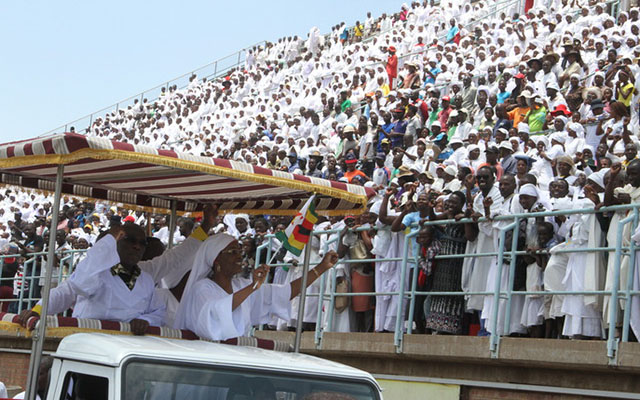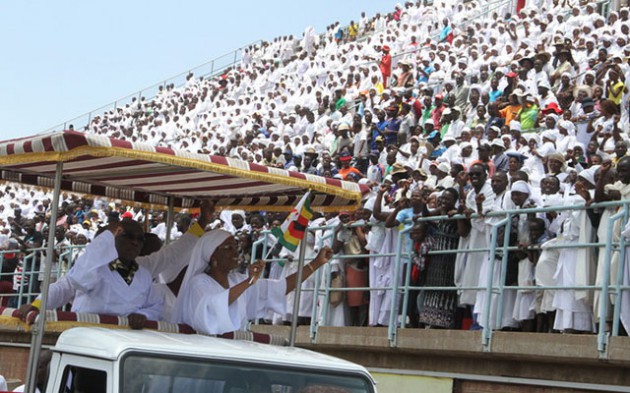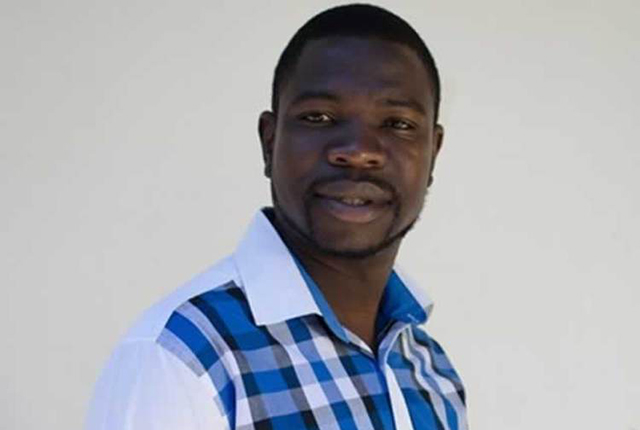Celebrating Freedom of Worship at Rufaro Stadium


First Lady Dr Amai Grace Mugabe waves as she arrives to address an indigenous apostolic churches’ interface dubbed “Super Sunday” at Rufaro Stadium
Dr Sekai Nzenza on Wednesday
It’s Sunday afternoon at Rufaro Stadium. I am not fully dressed for a church service because almost everyone I see is wearing a white gown. Just as well I had a white scarf in my handbag. I quickly cover my head with it so that I can at least look the part. It’s 11am and Rufaro Stadium is almost three quarters full of people dressed in the uniform of their church. I still need to belong to a church. At my father’s memorial last month, the Anglicans claimed me as their own because my parents were Anglicans.
But today, I am celebrating the diversity of worship at Rufaro Stadium. Despite the different churches that we attend, we are able to gather together and sing the same song. We tested this at my father’s memorial in September. First we gathered on Saturday and held a traditional nyota yababa, my father’s thirst, and killed a whole beast. There was plenty of home brewed beer to drink as we remembered my father.
The following day, we put all the remaining beer away and prepared for the church service. We asked people to come wearing their own denomination’s church uniform. This was the first time that an event like this had happened around our area. We waited to see if people would come wearing their uniforms and worship together.
On September 19 this year, if you had arrived in our village courtyard, you would have seen more than 500 people all dressed up in their own church uniforms. The African Zionist Church came with their West African type drum. The two drums quickly drowned the soft Catholic songs. Dancing and singing started immediately. Men, women and children sang with much joy singing the same songs, dancing to three different drums.
Now I am at Rufaro Stadium and ready to witness a national gathering at the Big Sunday for apostolic indigenous churches. Her Excellency, the First Lady, Dr Amai Grace Mugabe is the guest of honour. She is expected to arrive at any time.
Earlier on, I had parked my car at the flats next to Rufaro Stadium, where I normally leave it when I come shopping at Mbare Market. I have relatives who live in the old two-roomed houses built in the colonial era. There are communal toilets and showers there. But closer to the stadium are the new flats where my niece, daughter of my first cousin, Mai Bee and her husband Baba Bee live. Their flat is on the second floor and you can see the northern part of the stadium from their lounge room window. You can also hear everything from the loud speaker.
My cousin Piri did not have a VIP ticket like me so she said she would not risk being fried in the sun. Instead, she was going to watch the live proceedings on television while sharing beers at home with Baba Bee. I found a place in the VIP area not too far away from the podium where selected Bishops and other big people were to sit high up, behind Her Excellency Dr Amai Grace Mugabe. On my left, were two men from the Bethsaida Apostolic Church. On my right was an older lady dressed in a white dress and veil. Next to her was a tall man wearing the Mai Chaza’s Guta raJehovah brown uniform.
The lady on my right soon introduced herself to me as Sister Ethel Makoni from Rusape. She had left Gandanzara in Rusape at 3am arriving in Harare at 7am and by 8am she was in her seat. I arrived at 10am and she had already been there for two hours. I bought her some ice cream and we started talking and commenting on the ceremony. I learn that Sister Ethel is in her early 70s and she belongs to the Johanne Masowe Apostolic faith church. She lives in a commune and has never married.
Piri sends a WhatsApp message asking about the people in the stadium. I tell her that there were some big people in the higher VIP area, but I am not seating that close to them. Piri wants to know their names, as if that makes any difference to her. I ignore her. The Jekenisheni Group comes into the stadium with synchronised dancing, drumming and singing. The crowds cheer and some dance from where they are standing.
Her Excellency Dr Amai Grace Mugabe arrives and there is loud waving and applause. A number bishops and leaders are given time to greet the people and offer solidarity messages. The Minister of Sport and Culture, Honourable Makhosini Hlongwane introduces Dr Amai Grace Mugabe and again there is loud applause and whistles. Amai Grace Mugabe rises to the podium. She begins by acknowledging the thousands of people present and singles out each denomination by name.
Sometimes, it is difficult to hear every word from the First Lady because some people behind us are talking rather loudly. But I do catch some of the messages quite clearly. She talks about equality between the people and makes reference to Ephesians 2 verse 10. This verse in King James Version says. “For we are his workmanship, created in Christ Jesus unto good works, which God hath before ordained that we should walk in them.”
Her Excellency Dr Amai Grace Mugabe goes on to say that everyone in this country is important regardless of their physical stature. We are created in the image of God and are equal. During her speech she acknowledges the church’s role in the development of the country and requests the people to pray for wisdom and for the leadership of His Excellency President Robert Mugabe. She also encourages the apostolic groups to be united and to organise themselves so that they are not represented as small minority groups. This way, it would be easier for Government to help them.
Calling upon the entrepreneurship spirit of the people, she says Zimbabweans are people who work tirelessly. You often you see them trading and crossing borders. She says, “Zimbabwe is full of natural resources and the number one natural resource in this country are its people.” People clap and applaud.
Then she further addresses the people in Shona saying, “Hatidi kuti vanhu vatitarisire pasi. Imi vanhu vechipositori, muri vanhu vatinokudza, Tinoda kuti muitewo zvikoro zvenyu, vana vaende kuchikoro. Knowledge is power. Kana wava nefundo, hapana anogona kukuitisa zvausingade, nekuti unenge wava nefundo.”
During an interval we receive small packages of a bun, piece of chicken and a samoosa. Piri sends a text asking me to come back to the flat urgently. I quickly walk across to the flats thinking there is an emergency. I find Piri and Baba Bee relaxed and merry. There are empty cans of beer on the floor. Mai Bee is cooking meat in the kitchen and several kids are playing on the balcony.
“What is the matter?” I ask. “Beer is the matter. We have run out,” Piri says. Baba Bee nods. I am used to these demands for beer from Piri. It gets worse when she has company. But I do not have time to waste. I give her five dollars. Before I leave, she grabs my phone to look at the photos and videos that I have just taken at the stadium. Baba Bee looks at the photos and says he can recognise a number of big people in Government, church and the private sector.
“Iii, pakaipa!” says Piri, sitting down and taking a sip from her last can of beer. “Sisi, go back and try and shake hands with the First Lady Dr Amai Mugabe. When you have done that, do not greet anyone, come back and shake hands with me first,” Piri says. Somehow, Piri thinks shaking hands with the First Lady will bring good luck to her because Her Excellency Dr Amai Grace Mugabe is a powerful, fearless woman.
I return to the stadium and find many people dancing in front of the First Lady. I am not able to get anyway close to shake Her Excellency Dr Amai Grace Mugabe’s hand. I know Piri will be disappointed, so am I. But I decide to mingle with the crowd and dance. I am reminded of the time when Rufaro Stadium was full of people celebrating Zimbabwean independence. That was on 18th April 1980, when Zimbabwe got its independence in a historic and dramatic ceremony here at Rufaro Stadium.
The Zimbabwean flag was hoisted and there was a 21-gun salute in front of more than 40 000 invited guests. His Excellency President Robert Mugabe gave a speech and encouraged unity. He then lit the flame of independence. This flame was later taken by fast runners from Rufaro Stadium to the Kopje where it continues to burn today as a symbol of our freedom from British colonial rule.
Thirty-seven years later, we are back here at Rufaro Stadium and Her Excellency Dr Amai Grace Mugabe, the President’s wife, is the guest of honour. Many people in this stadium were born after independence. But we are here together, the old and the young, united in celebrating our spiritual diversity and who we are as Zimbabweans. Tinonamata Mwari mumwe chete.
- Dr Sekai Nzenza is a writer and cultural critic.







Comments